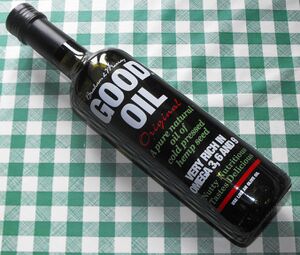
Hemp seed oil is pressed from the seed of the hemp (Cannabis sativa) plant irrespective of the strain of cannabis. Cold pressed, unrefined hemp oil is dark to clear light green in colour, with a pleasant nutty flavour. The darker the colour, the grassier the flavour.
Refined hemp seed oil is clear and colourless, with little flavour and lacks natural vitamins and antioxidants. Refined hemp seed oil is primarily used in body care products. The oil is of high nutritional value because its 3:1 ratio of omega-6 to omega-3 essential fatty acids, which matches the balance required by the human body.
Hemp seed oil is manufactured from varieties of Cannabis sativa that do not contain significant amounts of THC, the psychoactive element present in the cannabis plant. This manufacturing process typically includes cleaning the seed to 99.99% before pressing the oil. There is no THC within the hemp seed, although trace amounts of THC may be found in hemp seed oil when plant matter adheres to the seed surface during manufacturing. The modern production of hemp seed oil, particularly in Canada, has successfully lowered THC values since 1998. About 30–35% of the weight of hempseed is an edible oil that contains about 80% as essential fatty acids (EFAs); i.e., linoleic acid, omega-6 (LA, 55%), alpha-linolenic acid, omega-3 (ALA, 22%), in addition to gamma-linolenic acid, omega-6 (GLA, 1–4%) and stearidonic acid, omega-3 (SDA, 0–2%). The proportions of linoleic acid and alpha-linolenic acid in one tablespoon per day (15 ml) of hemp seed oil easily provides human daily requirements for EFAs. Unlike linseed oil, hemp seed oil can be used continuously without developing a deficiency or other imbalance of EFAs. This has been demonstrated in a clinical study, where the daily ingestion of linseed oil decreased the endogenous production of GLA.
In common with other oils, hemp seed oil provides 9 kcal/g. Compared with other culinary oils it is low in saturated fatty acids. Highly unsaturated oils, and especially poor quality oils, can spontaneously oxidize and turn rancid within a short period of time when they are not stored properly; i.e., in a cool/cold, dark place, preferably in a dark glass bottle. Hemp seed oil can be frozen for longer periods of storage time. Preservatives (antioxidants) are not necessary for high quality oils that are stored properly.
Hemp seed oil has a relatively low smoke point so it is really only suitable for dressings, gentle frying and roasting.
The oil is available in large branches of the main supermarkets or direct from Good Website
Find recipes that contain 'Hemp seed oil'
#hempseedoil #oils #linseed #antioxidants #storecupboarditems #condiments